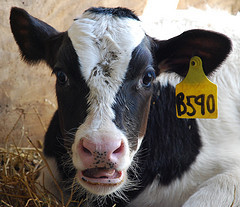Feds: Slaughterhouse Switched Out Unhealthy Cattle Heads During Inspectors’ Lunch Breaks

(afagen)
A federal grand jury has indicted the co-owners and two employees of the California slaughterhouse at the center of a massive beef recall earlier this year, and we’re now getting a better idea about how the plant allegedly got away with processing “diseased and unsound animals” that were “unfit for human food.”
Among the charges included in the indictment, feds say employees of Rancho Feeding Corp. knowingly distributed cattle with eye cancer. One method to sneak cattle with eye cancer past inspectors? The slaughterhouse pulled a switcheroo with unhealthy cattle heads while federal inspectors were at lunch, reports the Los Angeles Times.
First, feds say the slaughterhouse would knowingly purchase cattle that showed signs of eye cancer, likely older dairy cows sent for processing that were older and more diseased then the youngins raised for meat.
When a cattle showing signs of eye cancer came down the line, feds say workers would decapitate those cows and move them up the inspection line next to cattle heads without eye cancer, all while inspectors were away on their breaks, the indictment said.
The indictment also accuses one of the co-owners of telling workers to process cattle that had already been condemned by federal inspectors at the plant, leading them to simply carve out the “USDA Condemned” stamps on the carcasses.
The two owners and two workers are charged with conspiring to distribute adulterated, misbranded and uninspected meat, as well as mail fraud for distributing the meat through the U.S. Postal Service.
The U.S. Department of Agriculture’s Food Safety and Inspection Service shut down Rancho Feeding in January, before issuing a recall of almost 10 million pounds of beef that had been sold to grocery chains across the country. Nestle also issued a voluntary recall for its Philly Steak and Cheese Hot Pockets.
Slaughterhouse owners indicted on charges of selling tainted beef [Los Angeles Times]
Want more consumer news? Visit our parent organization, Consumer Reports, for the latest on scams, recalls, and other consumer issues.

